

Introduction
Graduate education “makes the difference” not just for graduate students but for our University, our state and our world. For the student, it can make the difference between a job and a career. Or between a dream of pursuing a passion and actually pursuing it. Graduate education has made the difference between Clemson College and Clemson University. Between a good state school and a first-class R-1 institution. Between a small college and an engine for regional economic growth. Between ingesting existing knowledge and creating new knowledge.
Graduate education generates a host of benefits for the local community and society at large. It provides educational infrastructure. It spurs innovation, entrepreneurship, economic development and global competitiveness. It broadens career opportunities, cultural and social development, and inclusivity. And as graduate education rates rise, so do rates of civic participation, social engagement, and charitable giving.
We invite you to learn more about the role of graduate education at Clemson and in South Carolina on this webpage and at our centennial events throughout the year. And, if you haven’t already, maybe you’d like to see what kind of difference it could make for you, too.
First Graduate
Clemson’s first-ever recipient of a master’s degree, Patrick Henry Hobson, was an early, if unassuming, force in the life of the school. But his educational pursuits a century ago set in motion a current, one that has grown swifter with the passage of time, carrying his family — and the Clemson Family — forward in the noble search for opportunity through learning.
On the 100th anniversary of graduate education at Clemson, we celebrate Pat Hobson’s milestone alongside ours. Read more about him here, or watch the video below.
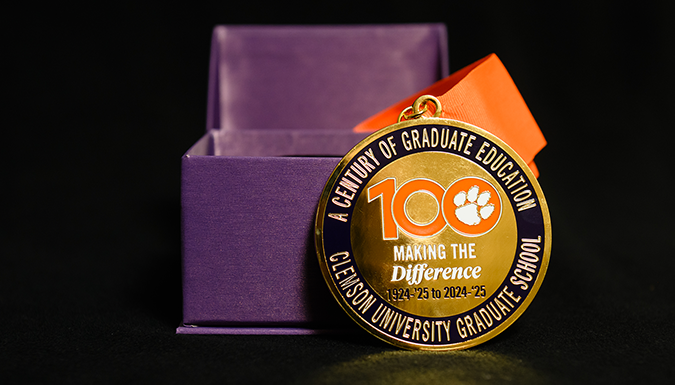
Support for Graduate Students
Help us provide more fully funded fellowships in all colleges and emergency funds for graduate students facing dire financial situations due to unexpected hardships. Every penny of your gift will directly support graduate students. Donate $100 or more, and you'll receive a commemorative medallion just like the one graduates and administrators are wearing at commencement ceremonies throughout our centennial year.
GiveBook Release
Get your copy of the forthcoming history of graduate education at Clemson by Frankie O. Felder, retired senior associate dean of the Graduate School and professor emerita. Coming Spring 2025.
Get Updates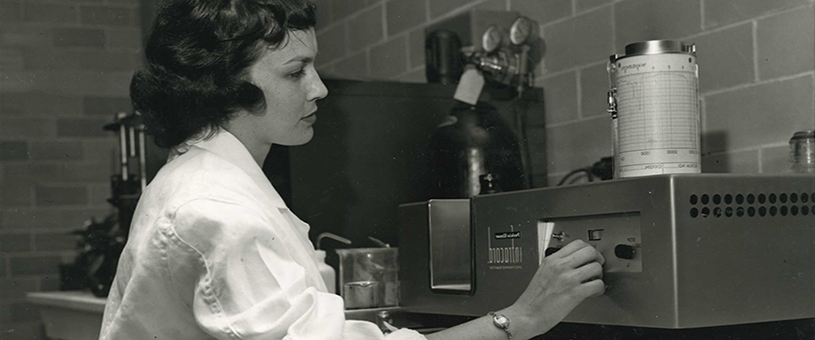
Origins of Graduate Education
[Clemson’s faculty] would engage in original and important research, by which knowledge would be increased, whilst the immediate objects . . . would be the diffusion of facts on all scientific subjects. It would be vain to attempt to fix a limit to the benefits that would thus be conferred upon mankind and their effects upon society . . . — Thomas Green Clemson
-
The purpose
[Clemson’s faculty] would engage in original and important research, by which knowledge would be increased, whilst the immediate objects . . . would be the diffusion of facts on all scientific subjects. It would be vain to attempt to fix a limit to the benefits that would thus be conferred upon mankind and their effects upon society . . . — Thomas Green Clemson1
In conceptualizing a “high seminary of learning” for South Carolina, Thomas Green Clemson knowingly set the stage for graduate education to emerge as an engine of economic development in the state. Graduate education quickly became synonymous with the application of theory to improving the practices of education and agriculture. The analysis of fertilizer, a contracted activity of the chemistry department that began in the late 1930s, would help restore depleted South Carolina soils, increase agricultural production, and spur a rapid development in opportunities for students at Clemson College to study beyond the baccalaureate degree.
NOTES:
- Holmes, A. and G. R. Sherrill. Thomas Green Clemson: His Life and Work. 1937, p. 129.
-
The process
Graduate coursework initially responded to the needs of veterans and to the interests of teachers wanting to improve their classroom skills, but also — from its inception — attracted international students’ attention. On June 3, 1924, Patrick Hobson of Sandy Springs, South Carolina, earned the first master’s degree awarded at Clemson, an M.S. in vocational education. The third graduate degree, a master’s in textile industrial education awarded to Ko-Chia Li from Mukden, China, on June 1, 1926, initiated an enrollment trend that has catapulted China to its status as the number-one sending country for international graduate students for many years.
From 1938 until 1945, all aspects of graduate education (courses, programs, policies, procedures, admission, and graduation) developed under the auspices of the Committee on Graduate Instruction, chaired by F. H. H. Calhoun, Dean of the School of Chemistry and Geology. Twice during these years, the University’s attempts to formalize graduate education were thwarted because of the challenges to the Committee to maintain the necessary standards of quality.
By the spring of 1945, the Committee on Graduate Instruction had determinerd that 19 courses could be offered immediately by the schools of agriculture, chemistry, engineering, textiles, and arts and sciences. asked University President Robert Franklin Poole to appoint a Dean of the Graduate School. That summer, the Board of Trustees approved the Committee’s proposed graduate program of study and, that fall, formally admitted the first class of students into “the Graduate School.” However, it would not be until June 15, 1951, that Herbert J. Webb, Chair of the Department of Chemistry and Toxicology, was appointed as the first Dean of the Graduate School.
Now and Then
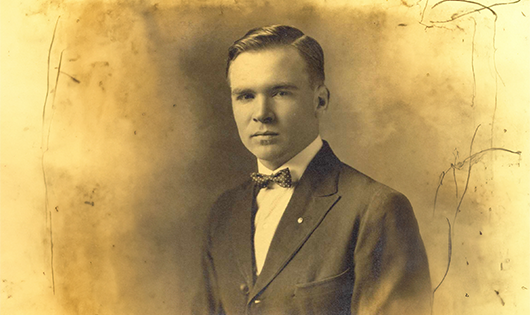
First graduate
Clemson's first graduate degree was an M.S. in vocational education awarded in June 1924 to Patrick H. Hobson from Sandy Springs, South Carolina. By that fall, he was superintendent of McCormick Schools in mid-state South Carolina.
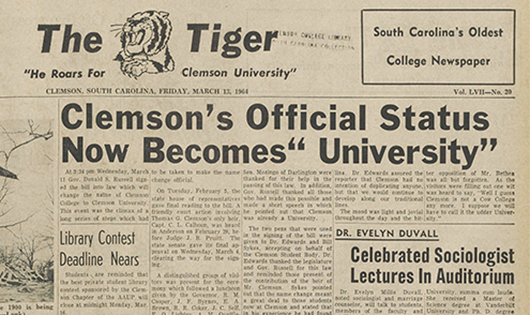
Becoming a university
In 1964, spurred largely by Clemson's burgeoning research enterprise and the establishment of master's and doctoral degrees, South Carolina Governor Donald Russell signed a bill that changed the name of Clemson College to Clemson University.
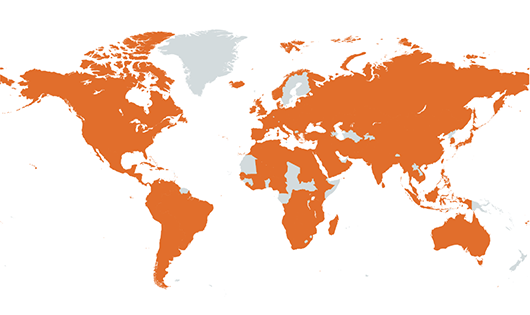
Global draw
Clemson has welcomed graduate students from 152 countries since 1924.
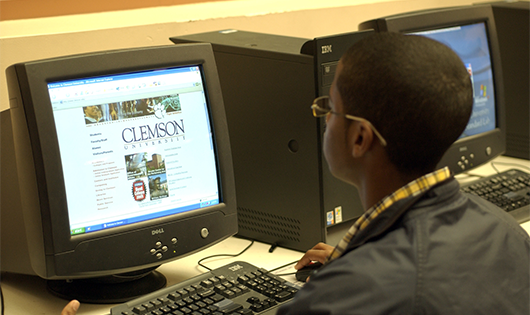
Online programs
The first fully online graduate program to appear in the Graduate Announcements was the Ph.D. program in education leadership in 2005. The colleges now offer dozens of fully online programs and many hybrid programs, as well.
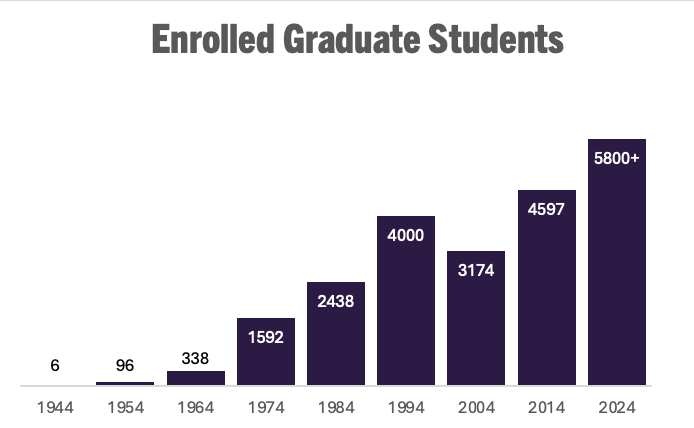
Sustained growth
With more than 190 graduate programs and a grand total of 58,208 graduate degrees awarded, graduate education has allowed Clemson to honor its land grant commitment while maturing into an R-1 research university with global vision.
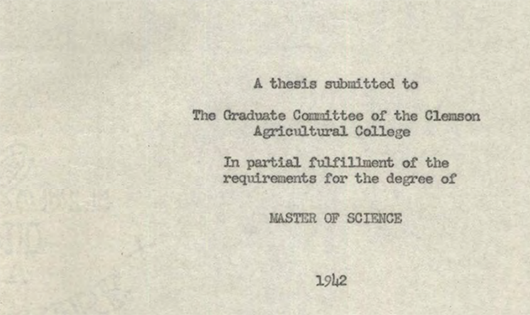
Dissertations and theses online
Clemson theses and dissertations from 2006 to the present are available online to anyone with internet access. Pre-2006 theses and dissertations are available to users on the Clemson campus or using the Clemson VPN. Each year, researchers and scholars around the world download a Clemson thesis or dissertation more than 750,000 times.

1 in 5 Clemson students
One in five Clemson students is a graduate student. At 22% of the student body, graduate students study and work all over the main campus, at ICAR, Greenville One, Research and Education Centers (RECs) throughout the state, and other remote campuses.
(Past) Events
Keynote Lecture: David Beasley
Former S.C. governor and 2020 Nobel Prize winner David Beasley, sponsored by the College of Behavioral, Social and Health Sciences and the Department of Public Health Sciences. October 9 at 2:00 p.m. at the Watt Family Innovation Center. Open to all.
CAFLS Poster Competition
Faculty and staff from the College of Agriculture, Forestry and Life Sciences participated in a centennial poster competition as a special add-on to the College's Graduate Research Symposium on August 19. The event's promotional slideshow features photos of agricultural research and outreach from the past 100 years.
SCIENCE Editor Holden Thorp
The College of Science will host Holden Thorp, editor-in-chief of the Science family of journals on November 7. Topic: Impact of science and graduate education on society. Watch this space for further details
STEM All In
CU STEM All In is a series of events for current Clemson STEM undergraduate students who want to learn more about graduate school and pursuing careers with industry using a graduate degree.
CoE Celebration
The College of Education celebrated 100 years of graduate education on January 31. The college welcomed faculty, staff, alumni, students and special guests, including Frankie Felder, senior dean emerita of the Graduate School, who provided a historical overview of graduate education at Clemson. The event also recognized recipients of our graduate student awards of excellence.
CAAC Networking & Panel
The College of Architecture, Arts and Construction invited graduate students to network with fellow alumni and hear from a distinguished panel discussing the impact of CAAC graduate programs on their lives and careers.


